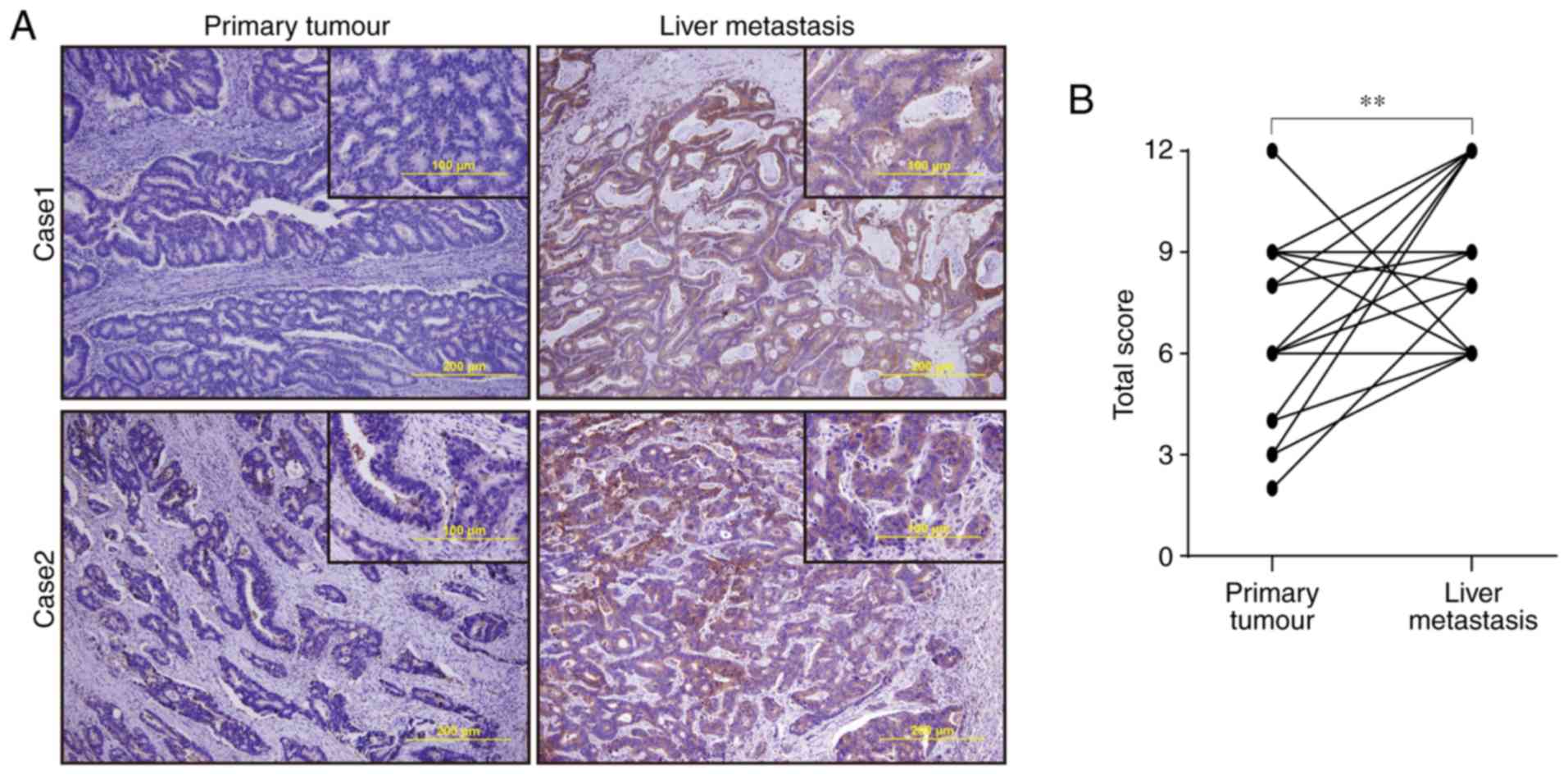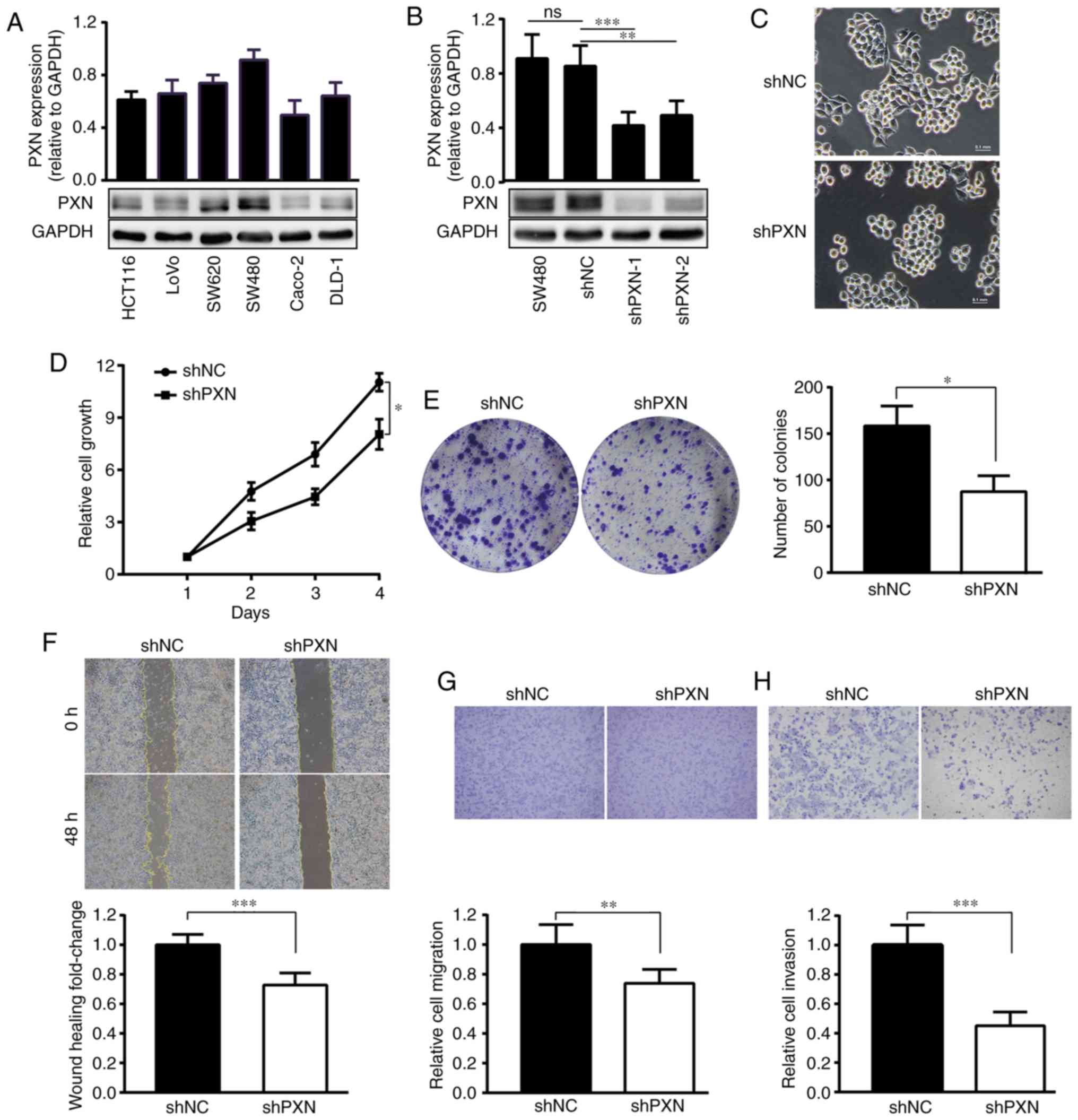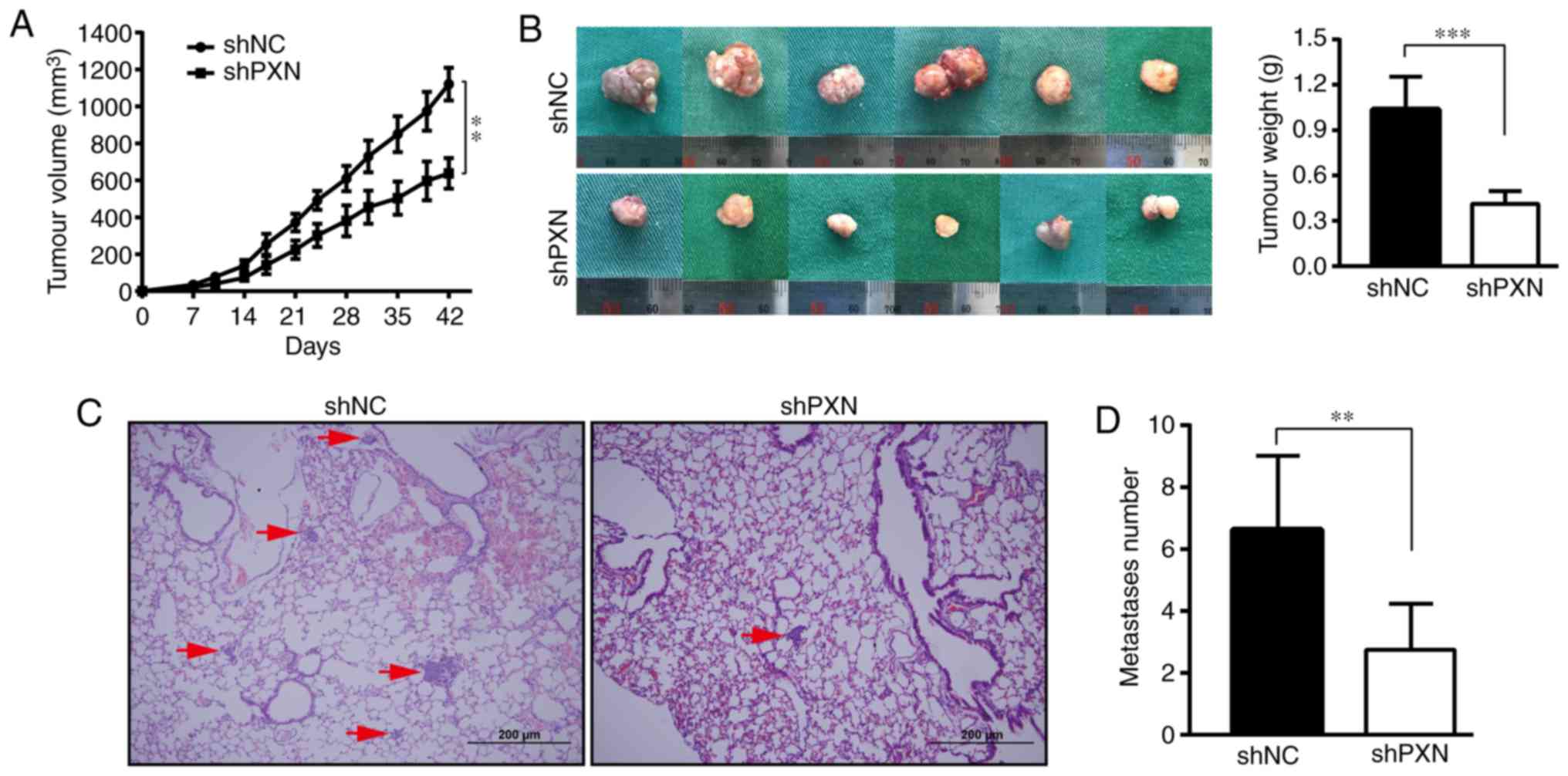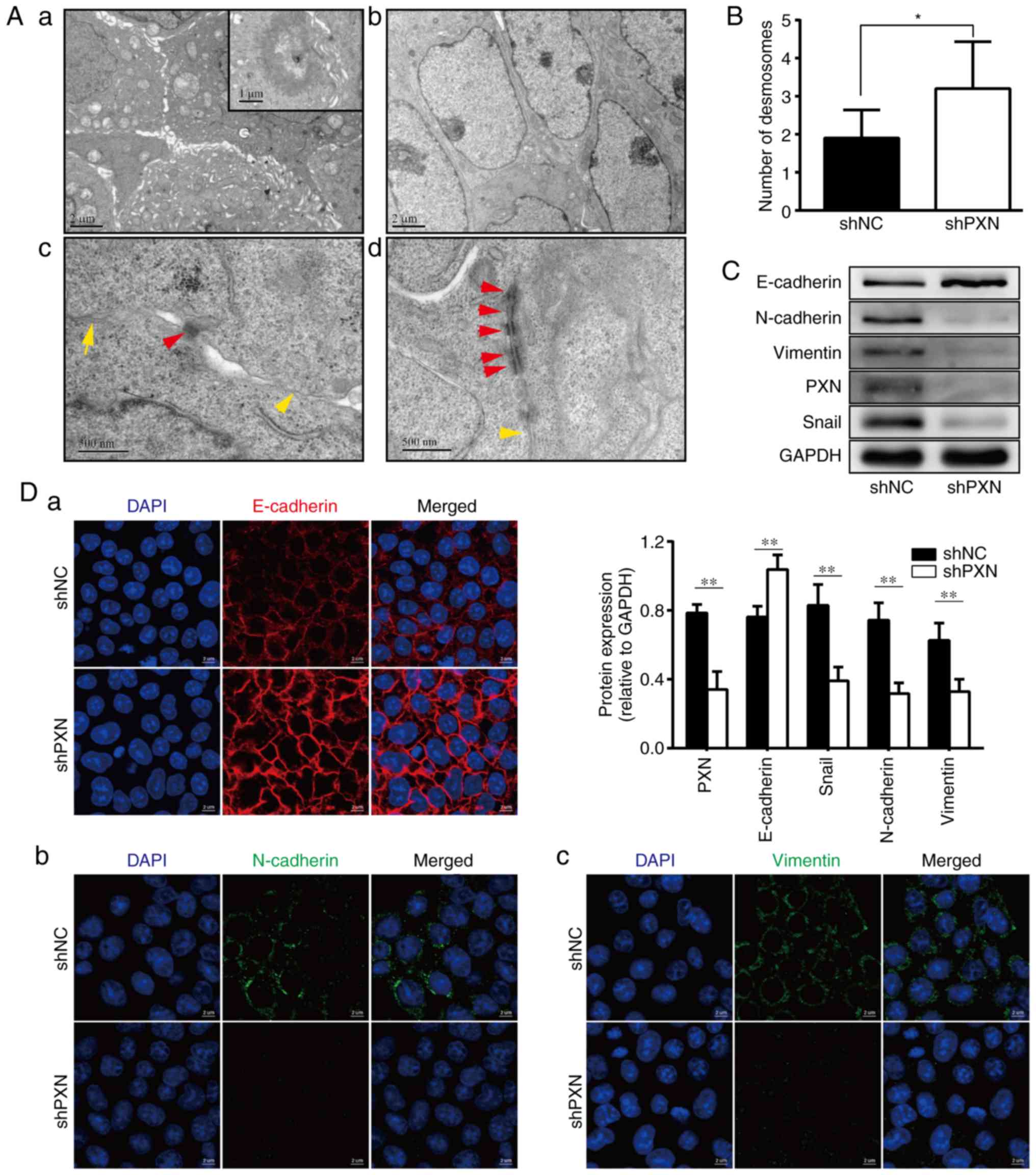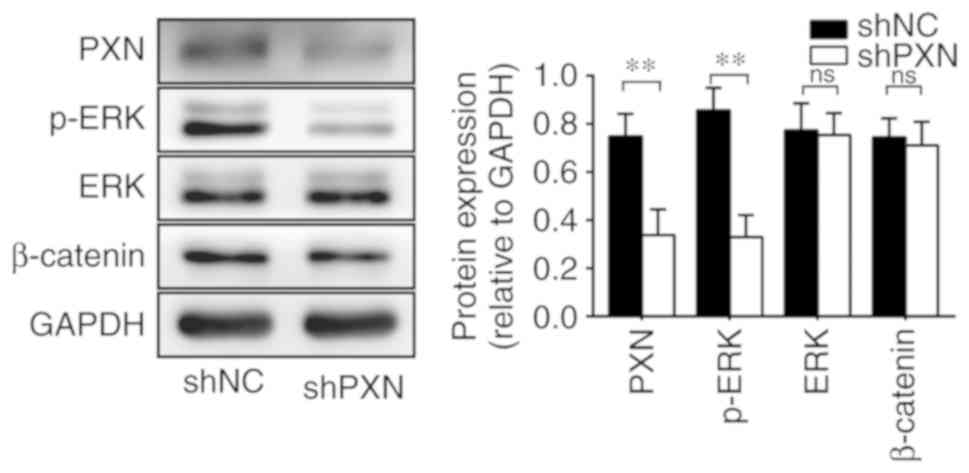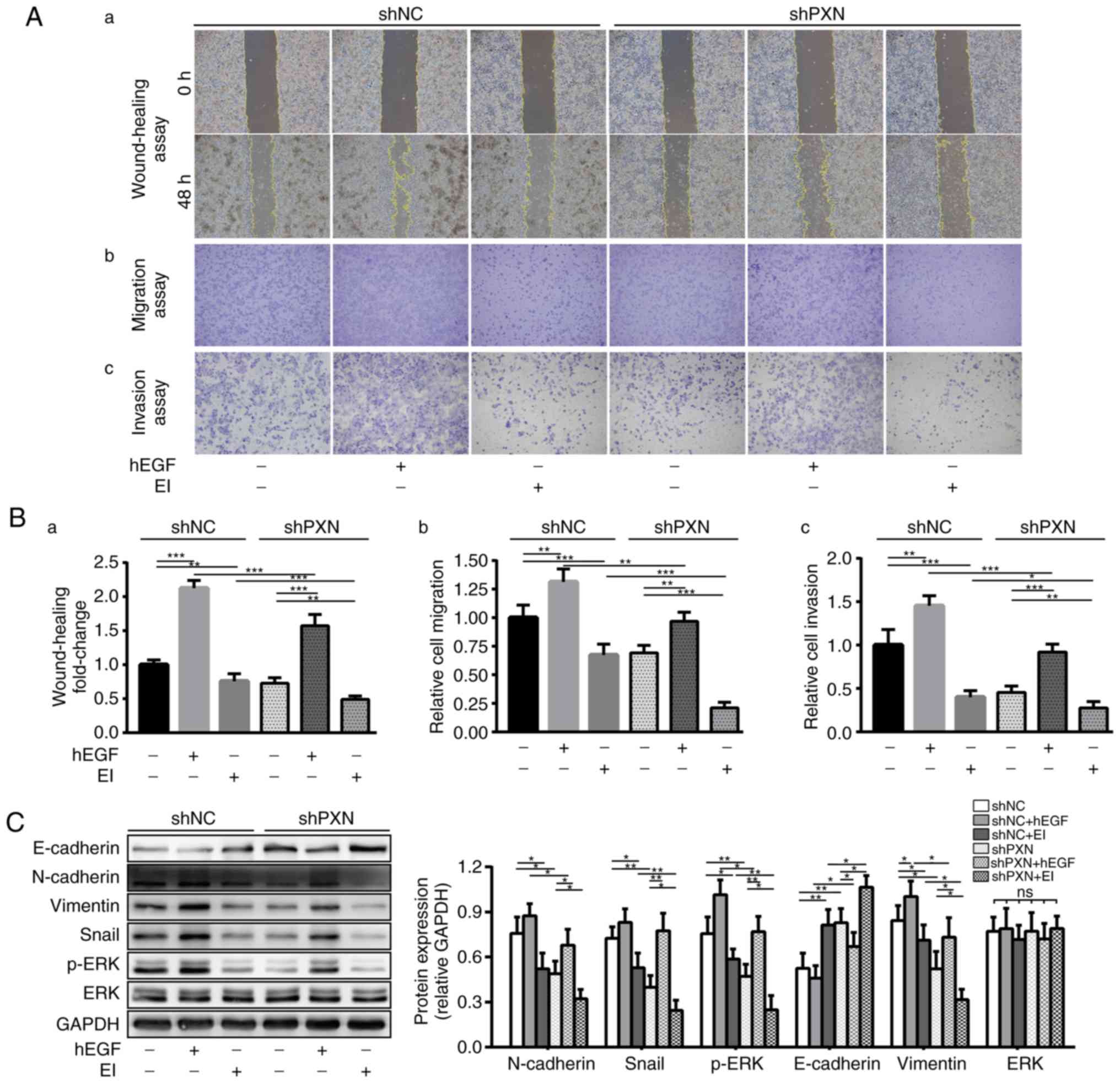|
1
|
Torre LA, Bray F, Siegel RL, Ferlay J,
Lortet-Tieulent J and Jemal A: Global cancer statistics, 2012. CA
Cancer J Clin. 65:87–108. 2015. View Article : Google Scholar : PubMed/NCBI
|
|
2
|
Siegel RL, Miller KD, Fedewa SA, Ahnen DJ,
Meester R, Barzi A and Jemal A: Colorectal cancer statistics, 2017.
CA Cancer J Clin. 67:177–193. 2017. View Article : Google Scholar : PubMed/NCBI
|
|
3
|
Cao H, Xu E, Liu H, Wan L and Lai M:
Epithelial-mesenchymal transition in colorectal cancer metastasis:
A system review. Pathol Res Pract. 211:557–569. 2015. View Article : Google Scholar : PubMed/NCBI
|
|
4
|
Mizukoshi K, Okazawa Y, Haeno H, Koyama Y,
Sulidan K, Komiyama H, Saeki H, Ohtsuji N, Ito Y, Kojima Y, et al:
Metastatic seeding of human colon cancer cell clusters expressing
the hybrid epithelial/mesenchymal state. Int J Cancer.
146:2547–2562. 2019. View Article : Google Scholar : PubMed/NCBI
|
|
5
|
Lampropoulos P, Zizi-Sermpetzoglou A,
Rizos S, Kostakis A, Nikiteas N and Papavassiliou AG: TGF-beta
signalling in colon carcinogenesis. Cancer Lett. 314:1–7. 2012.
View Article : Google Scholar : PubMed/NCBI
|
|
6
|
Li T, Zhu J, Wang X, Chen G, Sun L, Zuo S,
Zhang J, Chen S, Ma J, Yao Z, et al: Long non-coding RNA lncTCF7
activates the Wnt/β-catenin pathway to promote metastasis and
invasion in colorectal cancer. Oncol Lett. 14:7384–7390.
2017.PubMed/NCBI
|
|
7
|
Hong SK, Park JR, Kwon OS, Kim KT, Bae GY
and Cha HJ: Induction of integrin β3 by sustained ERK activity
promotes the invasiveness of TGFβ-induced mesenchymal tumor cells.
Cancer Lett. 376:339–346. 2016. View Article : Google Scholar : PubMed/NCBI
|
|
8
|
Tanahashi T, Osada S, Yamada A, Kato J,
Yawata K, Mori R, Imai H, Sasaki Y, Saito S, Tanaka Y, et al:
Extracellular signal-regulated kinase and Akt activation play a
critical role in the process of hepatocyte growth factor-induced
epithelial-mesenchymal transition. Int J Oncol. 42:556–564. 2013.
View Article : Google Scholar : PubMed/NCBI
|
|
9
|
Smith BN, Burton LJ, Henderson V, Randle
DD, Morton DJ, Smith BA, Taliaferro-Smith L, Nagappan P, Yates C,
Zayzafoon M, et al: Snail promotes epithelial mesenchymal
transition in breast cancer cells in part via activation of nuclear
ERK2. PLoS One. 9:e1049872014. View Article : Google Scholar : PubMed/NCBI
|
|
10
|
Deakin NO and Turner CE: Paxillin comes of
age. J Cell Sci. 121:2435–2444. 2008. View Article : Google Scholar : PubMed/NCBI
|
|
11
|
López-ColoméLee-Rivera I,
Benavides-Hidalgo R and López E: Paxillin: A crossroad in
pathological cell migration. J Hematol Oncol. 10:502017. View Article : Google Scholar : PubMed/NCBI
|
|
12
|
Zhao CJ, Du SK, Dang XB and Gong M:
Expression of paxillin is correlated with clinical prognosis in
colorectal cancer patients. Med Sci Monit. 21:1989–1995. 2015.
View Article : Google Scholar : PubMed/NCBI
|
|
13
|
Du C, Wang X, Zhang J, Liu X, Zhu J and
Liu Y: Paxillin is positively correlated with the
clinicopathological factors of colorectal cancer, and knockdown of
Paxillin improves sensitivity to cetuximab in colorectal cancer
cells. Oncol Rep. 35:409–417. 2016. View Article : Google Scholar : PubMed/NCBI
|
|
14
|
Chen DL, Wang DS, Wu WJ, Zeng ZL, Luo HY,
Qiu MZ, Ren C, Zhang DS, Wang ZQ, Wang FH, et al: Overexpression of
paxillin induced by miR-137 suppression promotes tumor progression
and metastasis in colorectal cancer. Carcinogenesis. 34:803–811.
2013. View Article : Google Scholar : PubMed/NCBI
|
|
15
|
Joo D, Woo JS, Cho KH, Han SH, Min TS,
Yang DC and Yun CH: Biphasic activation of extracellular
signal-regulated kinase (ERK) 1/2 in epidermal growth factor
(EGF)-stimulated SW480 colorectal cancer cells. BMB Rep.
49:220–225. 2016. View Article : Google Scholar : PubMed/NCBI
|
|
16
|
Takahashi E: The regulation of epithelial
mesenchymal transition in ocular disorders. Nippon Ganka Gakkai
Zasshi. 120:783–790. 2016.(In Japanese). PubMed/NCBI
|
|
17
|
Yang HJ, Chen JZ, Zhang WL and Ding YQ:
Focal adhesion plaque associated cytoskeletons are involved in the
invasion and metastasis of human colorectal carcinoma. Cancer
Invest. 28:127–134. 2010. View Article : Google Scholar : PubMed/NCBI
|
|
18
|
Ikuta D, Miyake T, Shimizu T, Sonoda H,
Mukaisho KI, Tokuda A, Ueki T, Sugihara H and Tani M: Fibrosis in
metastatic lymph nodes is clinically correlated to poor prognosis
in colorectal cancer. Oncotarget. 9:29574–29586. 2018. View Article : Google Scholar : PubMed/NCBI
|
|
19
|
Takahashi H, Sakakura K, Kawabata-Iwakawa
R, Rokudai S, Toyoda M, Nishiyama M and Chikamatsu K:
Immunosuppressive activity of cancer-associated fibroblasts in head
and neck squamous cell carcinoma. Cancer Immunol Immunother.
64:1407–1417. 2015. View Article : Google Scholar : PubMed/NCBI
|
|
20
|
Mantonakis E, Giaginis C, Pikoulis E,
Felekouras E, Patsouris E, Liakakos T, Papalampros E and Theocharis
S: FAK, Src and p-Paxillin expression is decreased in liver
metastasis of colorectal carcinoma patients. J BUON. 22:1097–1106.
2017.PubMed/NCBI
|
|
21
|
Belluco C, Mammano E, Petricoin E,
Prevedello L, Calvert V, Liotta L, Nitti D and Lise M: Kinase
substrate protein microarray analysis of human colon cancer and
hepatic metastasis. Clin Chim Acta. 357:180–183. 2005. View Article : Google Scholar : PubMed/NCBI
|
|
22
|
Deakin NO, Pignatelli J and Turner CE:
Diverse roles for the paxillin family of proteins in cancer. Genes
Cancer. 3:362–370. 2012. View Article : Google Scholar : PubMed/NCBI
|
|
23
|
Devreotes P and Horwitz AR: Signaling
networks that regulate cell migration. Cold Spring Harb Perspect
Biol. 7:a0059592015. View Article : Google Scholar : PubMed/NCBI
|
|
24
|
Meng Y, Lu Z, Yu S, Zhang Q, Ma Y and Chen
J: Ezrin promotes invasion and metastasis of pancreatic cancer
cells. J Transl Med. 8:612010. View Article : Google Scholar : PubMed/NCBI
|
|
25
|
Ren J, Hamada J, Okada F, Takeichi N,
Morikawa K, Hosokawa M and Kobayashi H: Correlation between the
presence of microvilli and the growth or metastatic potential of
tumor cells. Jpn J Cancer Res. 81:920–926. 1990. View Article : Google Scholar : PubMed/NCBI
|
|
26
|
Hodge RG and Ridley AJ: Regulating Rho
GTPases and their regulators. Nat Rev Mol Cell Biol. 17:496–510.
2016. View Article : Google Scholar : PubMed/NCBI
|
|
27
|
Barros JC and Marshall CJ: Activation of
either ERK1/2 or ERK5 MAP kinase pathways can lead to disruption of
the actin cytoskeleton. J Cell Sci. 118:1663–1671. 2005. View Article : Google Scholar : PubMed/NCBI
|
|
28
|
Alroy J, Pauli BU and Weinstein RS:
Correlation between numbers of desmosomes and the aggressiveness of
transitional cell carcinoma in human urinary bladder. Cancer.
47:104–112. 1981. View Article : Google Scholar : PubMed/NCBI
|
|
29
|
Collins JE, Taylor I and Garrod DR: A
study of desmosomes in colorectal carcinoma. Br J Cancer.
62:796–805. 1990. View Article : Google Scholar : PubMed/NCBI
|
|
30
|
Tumbarello DA, Brown MC, Hetey SE and
Turner CE: Regulation of paxillin family members during
epithelial-mesenchymal transformation: A putative role for paxillin
delta. J Cell Sci. 118:4849–4863. 2005. View Article : Google Scholar : PubMed/NCBI
|
|
31
|
Kowtharapu BS, Murin R, Jünemann AGM and
Stachs O: Role of corneal stromal cells on epithelial cell function
during wound healing. Int J Mol Sci. 19:4642018. View Article : Google Scholar
|
|
32
|
Takahashi E, Inoue T, Fujimoto T, Kojima S
and Tanihara H: Epithelial mesenchymal transition-like phenomenon
in trabecular meshwork cells. Exp Eye Res. 118:72–79. 2014.
View Article : Google Scholar : PubMed/NCBI
|
|
33
|
Deakin NO and Turner CE: Distinct roles
for paxillin and Hic-5 in regulating breast cancer cell morphology,
invasion, and metastasis. Mol Biol Cell. 22:327–341. 2011.
View Article : Google Scholar : PubMed/NCBI
|
|
34
|
Zouq NK, Keeble JA, Lindsay J, Valentijn
AJ, Zhang L, Mills D, Turner CE, Streuli CH and Gilmore AP: FAK
engages multiple pathways to maintain survival of fibroblasts and
epithelia: Differential roles for paxillin and p130Cas. J Cell Sci.
122:357–367. 2009. View Article : Google Scholar : PubMed/NCBI
|
|
35
|
Simpson CD, Anyiwe K and Schimmer AD:
Anoikis resistance and tumor metastasis. Cancer Lett. 272:177–185.
2008. View Article : Google Scholar : PubMed/NCBI
|
|
36
|
Stemmer V, de Craene B, Berx G and Behrens
J: Snail promotes Wnt target gene expression and interacts with
beta-catenin. Oncogene. 27:5075–5080. 2008. View Article : Google Scholar : PubMed/NCBI
|
|
37
|
Ha GH, Park JS and Breuer EK: TACC3
promotes epithelial-mesenchymal transition (EMT) through the
activation of PI3K/Akt and ERK signaling pathways. Cancer Lett.
332:63–73. 2013. View Article : Google Scholar : PubMed/NCBI
|
|
38
|
Subauste MC, Pertz O, Adamson ED, Turner
CE, Junger S and Hahn KM: Vinculin modulation of paxillin-FAK
interactions regulates ERK to control survival and motility. J Cell
Biol. 165:371–381. 2004. View Article : Google Scholar : PubMed/NCBI
|
|
39
|
Sen A, De Castro I, Defranco DB, Deng FM,
Melamed J, Kapur P, Raj GV, Rossi R and Hammes SR: Paxillin
mediates extranuclear and intranuclear signaling in prostate cancer
proliferation. J Clin Invest. 122:2469–2481. 2012. View Article : Google Scholar : PubMed/NCBI
|
|
40
|
Ishibe S, Joly D, Zhu X and Cantley LG:
Phosphorylation-dependent paxillin-ERK association mediates
hepatocyte growth factor-stimulated epithelial morphogenesis. Mol
Cell. 12:1275–1285. 2003. View Article : Google Scholar : PubMed/NCBI
|
|
41
|
Herreros L, Rodríguez-Fernandez JL, Brown
MC, Alonso-Lebrero JL, Cabañas C, Sánchez-Madrid F, Longo N, Turner
CE and Sanchez-Mateos P: Paxillin localizes to the lymphocyte
microtubule organizing center and associates with the microtubule
cytoskeleton. J Biol Chem. 275:26436–26440. 2000. View Article : Google Scholar : PubMed/NCBI
|
|
42
|
Romanova LY, Hashimoto S, Chay KO,
Blagosklonny MV, Sabe H and Mushinski JF: Phosphorylation of
paxillin tyrosines 31 and 118 controls polarization and motility of
lymphoid cells and is PMA-sensitive. J Cell Sci. 117:3759–3768.
2004. View Article : Google Scholar : PubMed/NCBI
|
|
43
|
Rose DM, Han J and Ginsberg MH: Alpha4
integrins and the immune response. Immunol Rev. 186:118–124. 2002.
View Article : Google Scholar : PubMed/NCBI
|
|
44
|
Rhee I, Zhong MC, Reizis B, Cheong C and
Veillette A: Control of dendritic cell migration, T cell-dependent
immunity, and autoimmunity by protein tyrosine phosphatase PTPN12
expressed in dendritic cells. Mol Cell Biol. 34:888–899. 2014.
View Article : Google Scholar : PubMed/NCBI
|
|
45
|
Parsons SA, Sharma R, Roccamatisi DL,
Zhang H, Petri B, Kubes P, Colarusso P and Patel KD: Endothelial
paxillin and focal adhesion kinase (FAK) play a critical role in
neutrophil transmigration. Eur J Immunol. 42:436–446. 2012.
View Article : Google Scholar : PubMed/NCBI
|
|
46
|
Zhang LL, Zhang LF and Shi YB:
Down-regulated paxillin suppresses cell proliferation and invasion
by inhibiting M2 macrophage polarization in colon cancer. Biol
Chem. 399:1285–1295. 2018. View Article : Google Scholar : PubMed/NCBI
|















